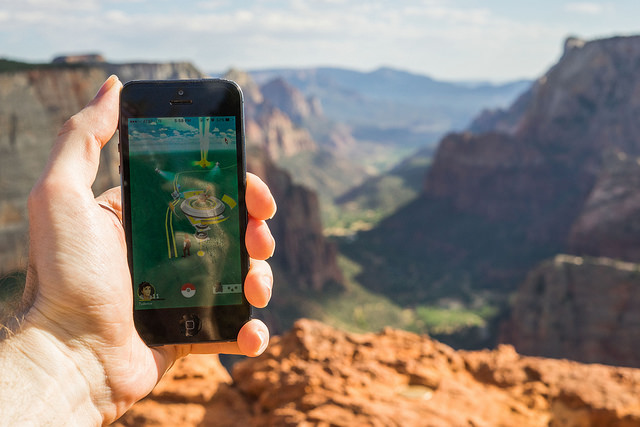Picture a clear, idyllic summer day on an Ontario lake shore.
The Canadian sun warms the harbor of Kenora, from which stretches out almost five thousand square miles of sun spackled water dotted with 14,000 wooded islands.
A pack of zealous teens emerges from a side street, hovering over their phones as they chase down Pokémon, finally stopping to stomp repeatedly on a specific square of concrete. Woe to any poor ants out foraging.
Woe, too, to any players who might stumble out into traffic while chasing the game’s fictional character and to those far and wide who have fallen off of cliffs or been lured by thieves to isolated locations. Before too long we might even hear of a Pokémon Go-related death.
Traffic, cliffs and potential casualties aside, the game itself is still better than sitting on a couch all day. It draws many living room-dwelling teenagers out into the light of day where they share in each other’s company and take part in a larger community—both real and virtual, providing a strong system of belonging. In this respect Pokémon and other forms of augmented reality, which are posed to become the next big thing, provide an enhancing experience, improving many players’ lives.
Augmented reality also holds out the promise of being able to help repairmen fix mechanical failures in appliances, improve dating apps and help strangers with something to share find each other in public. It’s not hard to envision a near future in which we all utilize augmented reality fairly consistently, replacing that bulky, archaic technological brick we call a smart phone.
But Pokémon Go and other wonders of the modern app world have dangers that go far beyond the physical risk of stubbed toes and stumbling. They skew how we interact with our world. Just as the food industry purposefully creates “craveable” snacks and dishes by adding ingredients like salt, sugar, fat and caffeine in order to drive repeat sales, augmented reality creates “craveable” sterilized interactions with the world. It is the ultimate marketer’s dream, empowering marketers to influence our perceptions of the world and therefore our decisions about what we buy, what activities we engage in and the people we meet.
The Chandogya Upanishad, one of the most ancient of Hindu texts, includes a phrase “Tat Tvam Asi.” This Sanskrit saying seeks to describe the relationship between the individual and the absolute. There are a few variations of translations, including “Thou art that” and “You are what you seek.”
Tat Tvam Asi is one of the foundations for non-dualistic thinking. Put differently, we are all one. Father Richard Rohr echoes this lesson when he says, “God is everywhere or he is nowhere.” Jewish philosopher Martin Buber alludes to it in “I and Thou.” Personally, I find this way of thinking about spirituality quite comforting because it reaffirms the existence of an all-encompassing, spiritual presence.
As a believer in such a presence and its expression through life and beauty in our world, I can’t help questioning the desire to place filters between ourselves and the authentic world.
The difference can be compared to experiencing a beautiful sunset versus watching it on a computer screen. Yes, much of the beauty is transmitted through the screen, but it loses something along the way. To experience the pure joy of swimming with dolphins in the wild as I once had the awe-inspiring fortune of doing, we can’t put ourselves in a cage.
To truly win at Pokémon Go and other virtual reality games, we must “look up from our screens”—metaphorically speaking—and have a real engagement with the world around us in our day to day lives. In focusing solely and intently on capturing the character on our screens, we are distracted from what is truly important: the glorious world surrounding us.
In the face of an ever-increasing barrage of tempting distractions, how can we do this?
Train yourself to put your device down. Having reached your task or game’s goal, “reward yourself” with a break from it. Remember, the break is the real reward: not the task or game.
Use this break intentionally to stop, look and breathe. Take in the world around you, unfiltered. Consider how what you’re seeing, hearing, smelling and observing makes you feel.
Reflect on how these sensations guide you. Where do your thoughts travel in that moment? What path opens up in your mind? Dare to explore it.
Looking up from my own screen in this way to ponder this concept and the paradoxes of virtual “reality” inspired me to write the forthcoming novel, Evolved. I explore the seamless interconnection between organic and silicon-based life in a distant future where the eradication of truly authentic experiences threatens humanity’s very existence. Without having looked up, I would have lost this opportunity to grow.
In fact, virtual reality prevents us from winning in so many ways. Getting sucked in means losing sight of what we’re really seeking in life, instead pursuing cute little yellow characters with pointy ears. And, rarely if ever do we pause to consider the advertisers, Nintendo strategists and investors behind the company watching and influencing our decisions. We are both the seekers and the quarry in this game, whether we realize it or not.
Author: Matthew McKay
Image: Tydence Davis/Flickr
Editor: Catherine Monkman











Read 0 comments and reply